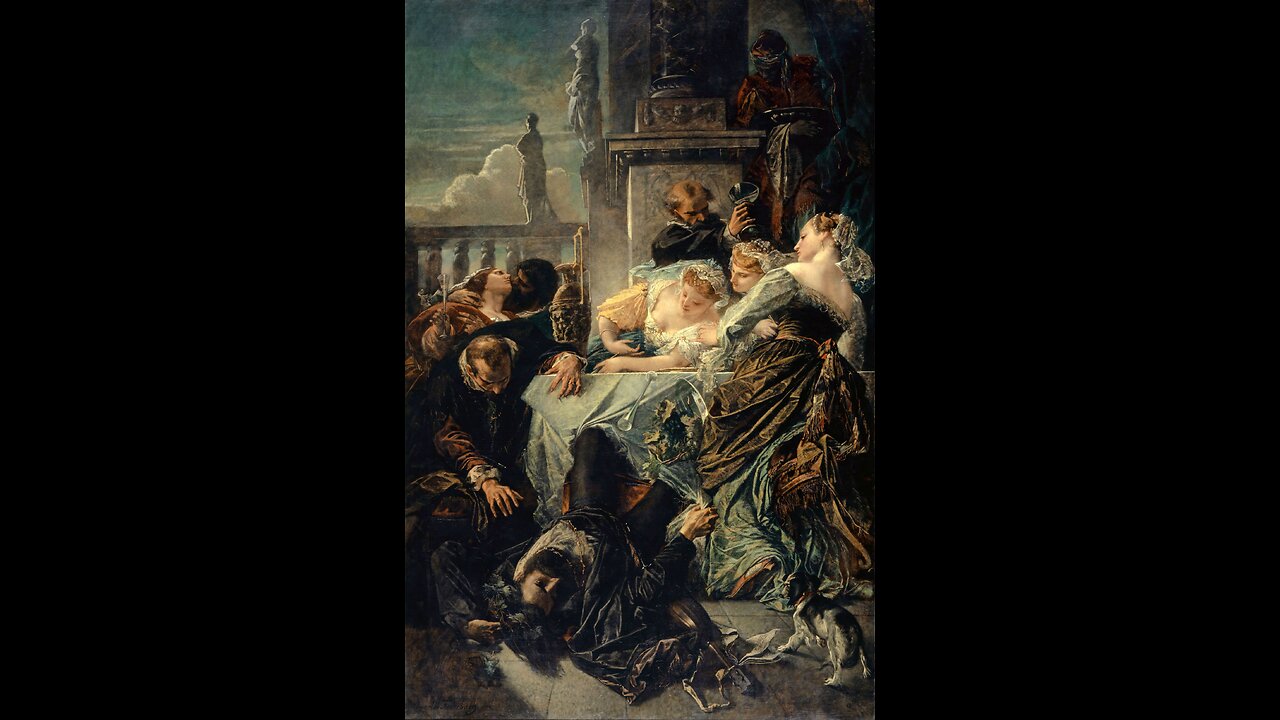Premium Only Content

"The Three Infernal Jokes" by Lord Dunsany
The West End of London during this time period would have been very fashionable and posh.
tout: in this context: one who solicits patronage. This word has two pronunciations, so if you'd use a different one, know mine is still an accepted one. (I didn't look it up before hand and upon initial recording tried it several ways, including both of the accepted ways, so I had my choice of which way to go with it, but didn't really know if one was more accepted than the other, as this is not an American English word, it appears to be entirely a British English word, so I really had no guess either way.)
baize: a coarse, typically green woolen material resembling felt, used especially for covering pool, snooker, and billiard tables.
£10,000 in 1916, depending on how you do your inflation adjustment, would be anywhere from £721,000 to £6.7 million. Let's just call it £1 million. A tidy sum to be sure. £50,000 obviously is 5x or at least £3.6 million. And that's PER YEAR for a lawyer of the day! *boggle*
High Court of Bow: It appears Bow is a parish in the borough of Tower Hamlets, county of Middlesex? There appears to have been some form of court there, a debt-court at least, and seemingly a county court, if that's different, but the idea of a "High Court of Bow" is likely a fiction from our author. Unless it is normal in England to refer to a county court as a high court? When it comes to the legal system, while the US system may derive from the English system, it is not identical to it. Indeed, the two systems have drifted noticeably apart over the past 250 years...
Arrah and begorrah: 'Arrah' is an expression of disbelief or wonder, while 'begorrah' means 'by God'. Urban Dictionary gives an entry for "arah begorrah!" as "a majorly boggerish Irish term used as a reaction to surprising or dreadful news." Although I'm not sure what a proper Irish pronunciation would be.
The picture used is "Der Tod des Dichters Pietro Aretino" (The Death of the Poet Pietro Aretino) (1854) by Anselm Feuerbach. In 1556, Pietro Aretino is said to have died of suffocation from laughing too much.
To follow along: https://www.gutenberg.org/files/13821/13821-h/13821-h.htm#jokes
-
 2:26:01
2:26:01
The Connect: With Johnny Mitchell
16 hours ago $4.19 earnedHow A Los Angeles Drug Kingpin Sold 40 TONS OF WEED, Got Life In Prison & Then Pardoned By Trump
27.8K6 -
 25:22
25:22
Forrest Galante
8 hours agoPrivate Tour of Australia’s Best Aquarium
40.2K4 -
 2:07:09
2:07:09
BlackDiamondGunsandGear
13 hours ago🔴 LIVE SHOW w/ DLD & Okayest Shooter
29.1K2 -
 4:32
4:32
TruthStream with Joe and Scott
5 days agoTo Unite Music Video 2025 in 432 HZ written by Joe Rosati & Steve Collins. featuring Stephen Tenner, Kristen Capolino and KC Sunshine. Produced by Lewis Herms
55K14 -
 3:09:13
3:09:13
Joker Effect
16 hours agoFIRST EVER AMATEUR BOXING EVENT STREAMED ON RUMBLE! BOUGHT TO YOU BY WOLFSDEN BOXING!
81.2K11 -
 3:33:13
3:33:13
Barry Cunningham
12 hours agoTHE DOGEFATHER & THE DON! HOW ELON MUSK & PRESIDENT TRUMP ARE SAVING AMERICA!
138K115 -
 6:55:08
6:55:08
Phyxicx
12 hours agoGetting ready for $350 tournament! - 5/31/2025
30.3K -
 5:28:16
5:28:16
Tommy's Podcast
10 hours agoE742: Atomic Piledriver
40.8K2 -
 3:54:51
3:54:51
Mally_Mouse
19 hours agoSpicy Saturday!! - Let's Play: Group Games w/Friends!
87.9K4 -
 8:11
8:11
Warren Smith - Secret Scholar Society
9 months ago $8.69 earnedThe Professor who Does Not Fear YouTube
50.8K14